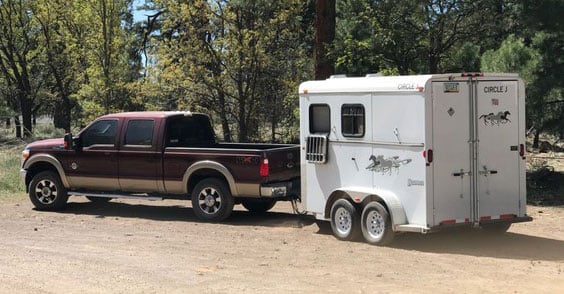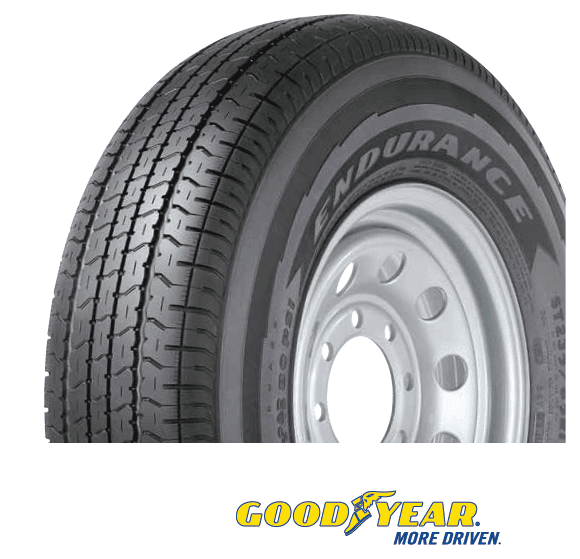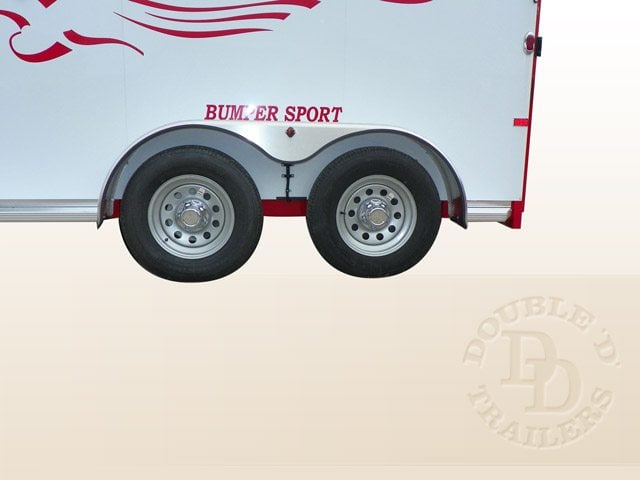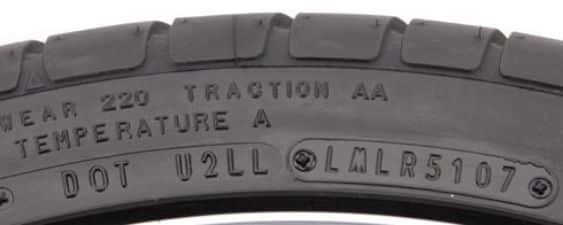How to Choose and Maintain Your Trailer Tires
When Should I Change My Horse Trailer Tires?
 No one likes getting a flat tire in the middle of a long trip. Besides the initial scare of the blowout, it can be dangerous to change a tire on the side of a busy road.
No one likes getting a flat tire in the middle of a long trip. Besides the initial scare of the blowout, it can be dangerous to change a tire on the side of a busy road.
Now imagine the same situation with a horse trailer…yikes! It’s ten times scarier and more dangerous.
That’s why you should know the basics of how to select and maintain your trailer tires. Plus, you should know when it’s time to replace old tires on your horse trailer. The right set of tires will help provide a smooth and comfortable ride for your horse. More importantly, they will help prevent a dangerous tire blow out.
How to Choose Your Horse Trailer Tires
If you buy a brand new trailer, the first big decision is done for you. Your trailer manufacturer should provide you with a safe set of tires that are properly matched to your trailer’s size.
Every horse trailer has a Gross Vehicle Weight Rating (GVWR) that describes the total amount of weight that the trailer is designed to handle. If you take this total amount divided by the number of trailer tires, you can find the amount of weight that each individual tire needs to be rated to carry.
Trailer tires often have an “LT” or “ST” designation. “LT” stands for “light truck” and “ST” stands for “special tires for trailer highway service.” While some people claim that LT tires provide a smoother ride, they are not appropriate for horse trailers.
LT tires are rated for less weight and do not have enough side wall stiffness to support top heavy loads like horse trailers. They will have a tendency to “roll” when going around curves. We recommend using ST tires that are properly matched to the size of your specific horse trailer type.
One more word of caution: Some horse owners think that they can safely overload their trailers with excess weight if they install tires rated for very heavy loads. For example, they may place tires appropriate for a horse trailer with living quarters on a much smaller two horse trailer.
This is a bad idea for several reasons. The trailer’s axles and brakes may become overloaded and fail. Plus, an overloaded trailer can cause hitch failure and strain on your tow vehicle. Finally, these over-rated tires will cause a very rough and bumpy ride for your horse.
What Horse Trailer Tire Brands are Best?

Towmax ST Tires: Jose explained that Towmax tires are, “the most reliable brand on the market.” This brand is especially popular because they offer a strong 5-year warranty. Towmax tires are used heavily on livestock trailers and are manufactured by respected TBC Brands. They are well known for creating great tires that work well even for high speed automobiles. This tire is rated “L” and has a speed rating of 75 mph.
Double D Trailers currently uses Towmax tires for all custom horse trailers as they offer the best value and warranty options.
Goodyear Endurance Tires: A second option for a great horse trailer tire is the Goodyear Endurance model. This is a newer tire from Goodyear and is one of the few tire options made in the USA. This brand comes with a strong 6-year warranty and an 87 MPH N speed rating. Jose feels that people who purchase this tire are “getting the best tire the industry has ever seen.”
The main trade off in purchasing the Goodyear tire over the Towmax is in the price. The Goodyear Endurance tires can be very expensive and are considered a “premier” option.
How Should You Store Your Trailer to Maintain the Tires?
With your regular car tires, thinning tire tread can be a clear indicator that your tires are ready to be replaced. This rule does not hold true with horse trailer tires. Instead, trailer tires often “age out” instead of “wear out.”
This means that the strength and integrity of the tire rubber can degrade over time due to exposure to sun, rain, and temperature extremes. This may happen long before the tire shows any visible signs of wear. Your horse trailer tire may look like it’s fine, but the rubber may have weakened over time.
Brad Heath, Double D Trailers owner, explained, “As your tires go through a heat cycle, they get hot and cold. This breaks down the rubber composition and the tires wear out faster.”
In order to extend the life of your horse trailer tires, it is extremely important to store your trailer indoors whenever possible. If you must store your trailer outdoors, use a trailer cover or tire covers to protect the rubber from direct sunlight.
For long term storage, put your trailer up on blocks and remove the tires altogether. This will help extend their lives.
Jose from Tredit Tires had one more useful tip. He explained that all tires have an anti-degradant substance inside the rubber that helps the tire resist UV damage from the sun. If a trailer is left to sit in one place for extended periods of time, that substance can settle in the bottom of the tire and even start to seep out. You may notice a brown area at the base of the tire.
To avoid this problem, he recommends simply turning the tires 180 degrees every 3-6 months. This will help the anti-degradant chemical to more evenly coat the tires and help provide better UV protection.
Is it Okay to Buy a Used Trailer with Used Tires?
If you are thinking of buying a used horse trailer, then you are going to want to check the tires very carefully. An advertisement may say “Tires like New,” but this might not tell the whole story. Even if the tires look like they are okay, you should find out how old they are and consider replacing them immediately. The rubber may have degraded and weakened over time.
When Should Trailer Tires be Replaced?
Most tire manufacturers will recommend that you change your horse trailer tires every four or five years depending on usage. It is our recommendation that you be very proactive with this and get on a regular schedule of changing your tires every four years. This is the best way to avoid a dangerous blowout situation.
You can find the age of your tires by checking the date code on their side wall. In the example below, the date code is “LMLR5107.” The “51” indicates that this tire was made in the 51st week of the year. The “07” means that it was made in 2007.
Why is Tire Inflation Important?
Another important consideration is the inflation level of your horse trailer tires. Keep the proper level of inflation in your tires for every single trip. Brad explained, “Using a horse trailer even once with over-inflated or under-inflated tires can cause excessive heat build up. This will actually weaken the tire and greatly reduce its life expectancy.”
Always check your tire pressure after long periods of time in storage. A tire typically loses 1-3 pounds of pressure (PSI) each month - even when in storage.
Is a Tire Pressure Monitoring System Right for You?
You can ensure that you always know exactly how well inflated each of your trailer tires is by installing a tire pressure monitoring system. Sensors on the valve stems wirelessly transmit information about the inflation level of each tire to a monitoring system on your dash -- you can even set an alarm to alert you to significant drops in pressure. They will work on nearly any size trailer tire and can be instrumental in preventing blow-outs during trips.
If you have any questions related to horse trailer tires or safety, please don’t hesitate to contact our team today.
> Just as tire maintenance is crucial, so is ensuring that your horses have a secure and comfortable barn. Learn more about the best horse barn options available.



